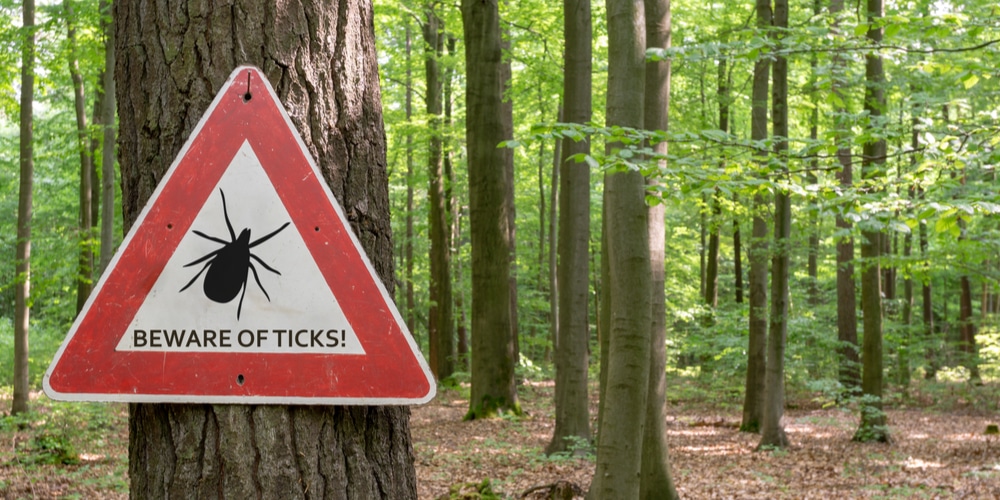Ticks are gross and very dangerous. They are the leading cause of vector-borne disease in the US, and their populations are booming. Considering that some ticks may carry harmful germs that cause diseases, most people who like walking through the woods and playing in the yard may want to know whether these potentially harmful critters fall from trees.
You might have heard that ticks can fall from trees onto unsuspecting individuals. So, do they? Yes, but less likely.
Typically, ticks don’t jump, fly or fall from trees. They like high humidity areas, so they are more likely to stay low to the ground (normally on tips of grass and areas with dense shrubs), where they can easily find a host. However, it is possible (but far less likely) for them to climb trees and fall from there.
This post will cover some misconceptions about ticks and other aspects of ticks. Read on to know where you are likely to meet ticks.
Where do ticks live?
Myths about ticks are proliferating just like their populations. For the unacquainted, ticks are small blood-sucking parasites that live in wooded areas and fields. Although they hang around all year long, they’re most active during warmer days, i.e., spring, summer, and fall.
Generally, ticks love moist and humid environments. Contrary to popular belief, these critters don’t live on their hosts, nor do they live in trees. Instead, they live close to their hosts or where they can easily grab onto hosts, typically in wooded and grassy areas.
Ticks’ hosts range from humans to pets to wild animals, but they will survive on shrubs and other vegetation.
Ticks will attach to their hosts to feed, and they detach themselves from the host once they have sucked enough blood. They will then find a place to molt.
Notably, a selection of ticks can bite humans and transmit diseases to humans. For this reason, you need to protect yourself and your family, especially during summer when ticks are most active.
However, when it comes to ticks infestations, it is worth noting that ticks don’t fly. They will likely transfer to your body when you brush against where they hide, especially in shaded areas. According to this post by CDC, ticks find their hosts by detecting breath, body odors, and body heat or vibrations. A few species are believed to recognize shadows.
Common myths about ticks
There are many situations when we can encounter ticks. This is especially true considering that ticks hand around year-round. Here are some myths about ticks you need to know:
1. Ticks fall from trees
Whilst many people believe that ticks jump out of trees to and on their hosts, it turns out that they are physically unable to do so. Ticks only crawl up and are even less likele to climb in trees.
When ticks get on us, they crawl upward until they hit a bare skin, and the back of the neck is often the first bare spot they find. This is what causes many people to think that ticks drop from trees.
2. Once you are bitten, you will get sick
It is indisputable that ticks are a leading cause of vector-borne diseases in the US. However, this doesn’t mean that every bite transmits diseases.
Typically, a tick needs to be attached to a host for more than 24 hours to transmit any disease. The bacterial diseases usually live in the parasites’ stomachs, and according to their way of feeding, the diseases take at least 24 hours to get to the saliva.
Checking yourself after traversing woody and grassy fields can help you find ticks before transmitting diseases to your bloodstream.
All in all, it is imperative to get tested for Lyme diseases and other infections after you have been bitten by a tick, no matter how long the tick bites you.
3. Every tick carries a disease
While most ticks carry and can transmit diseases, not all ticks are disease carriers. Even so, you are more likely to encounter an infected tick than one that doesn’t carry any diseases.
It is worth noting that deer ticks by far carry the highest number of infections. Other ticks you are likely to encounter are American dog ticks, black-legged ticks, lone star ticks, and rocky mountain wood ticks.
Do ticks fall from trees: Conclusion
It is possible for a tick to fall from a tree but not that likely as they are more commonly found living in grass and other ground cover.
Ticks love tall grass and cool, humid areas. If you are going to be in tall grass, it is advisable to wear long-sleeved shirts, long pants with rubber bands around the ankles, and shoes with socks.
Related Article: Can and Do Grasshoppers Bite?

